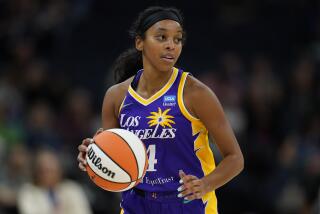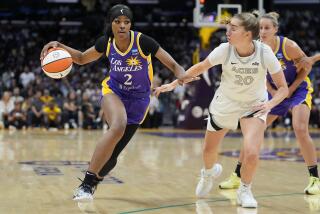A LONGSHOT : Once Again, the Odds Are Against Him, but Don’t Ever Count Out Michael Spinks
- Share via
ATLANTIC CITY, N.J. — At his training camp in Kiamesha Lake, N.Y., a few weeks ago, Michael Spinks recalled a memorable parade in St. Louis.
It was the city’s 1976 welcome for the Spinks brothers, Leon and Michael, who had just won gold medals in the Montreal Olympic Games. A motorcade met them at the airport and carried them to their home in the Pruitt-Igoe projects.
Sirens wailed, and passers-by cheered.
As the motorcade neared the projects, Michael Spinks began to giggle.
“I said to Leon: ‘Listen to those sirens--man, we got a police escort and we ain’t even in trouble!’ ”
Michael Spinks, who weighed in at 212 Saturday, remains a 4-1 underdog for his Monday night fight with heavyweight champion Mike Tyson, 218. But a dozen years ago, Spinks looked an even longer shot to make it out of Pruitt-Igoe.
For starters, unlike Leon, he first decided not to turn pro.
“The first thing I did was go down to the restaurant at Bridgeton, Mo., where I’d washed dishes before I went to the Olympics,” he said. “I wanted to show all the guys in the kitchen the gold medal, and they Xeroxed it. But the big surprise was my boss gave me back pay for the time I was at the Olympics.
“All this time, Butch Lewis is calling me. Butch came up to me after I’d won the gold in Montreal, a girl on each arm, and asked me if I wanted to turn pro, right now. I put my feet on a desk and said, ‘Right now, this is all I want to do.’
“So I went back to St. Louis, and Butch kept calling. I really didn’t want to turn pro. I knew about all the boxers who’d turned pro, took a beating, and then wound up without anything. I was afraid of that happening to me. Leon turned pro with Butch, and I was even afraid for Leon.
“I left the dish-washing job for an office job. I loved going home at night and telling people I had an office job.
“What it was was a night office job at the Monsanto Chemical plant. I’d push a cart from office to office, see, and empty ashtrays into a bucket.”
Spinks, 12 years later, doubles up, giggling.
“Hey, I liked that office job. I was bringing home $550 every two weeks. Then they transferred me to (another) building to clean bathrooms, where the chemicals were, and I started breathing those fumes. I took this as a demotion, seeing as how I’d had an office job before.
“Butch is still calling, almost all the time, saying: ‘Michael, you ready? You ready?’
“One night, I laid down on a cot in the women’s rest room and fell asleep. Well, my supervisor walks in, wakes me up and calls me every name under the sun. I’m sitting there, thinking that no way do I want to spend the rest of my life listening to this stuff.
“So, I said: ‘Sir, I’m going to do you a favor and rid yourself of me.’ I walked out.
“The next time Butch called, I said: ‘Yeah, Butch--I’m ready.’ ”
Mike Tyson. Power and Fear.
And from Michael Spinks, there is honesty about it all.
“Hey, I am not thrilled about the idea of getting into the ring with this guy,” Spinks said, unsmiling.
“He presents all kinds of problems. I’ve looked at a few of his fights on tape. What do you mean, what do I think? There’s not much to say. Obviously, I have to fight back. I’m not going to stand there and get hit by him. You try to hit Tyson without getting hit. I’ll try to get good shots.”
After Spinks easily beat Gerry Cooney here last January, he said of Cooney: “He gives you a lot,” he said.
Does Tyson give you anything?
“In delivering punches, he gives you something,” Spinks said, pausing.
“In the midst of all those punches he throws, he can be hit. So I will have to take chances. I can’t wait on him, because he’ll be all over me. I know that.”
Then he spoke of fear.
“The fear is always there, especially at night,” he said. “It’s in the background. When I’m in bed at night, and the fight suddenly comes into my mind, my heart rate goes up and I can’t sleep. I’ll put the fight out of my mind, for a minute or two. Then it comes back.
“I’ll think to myself, ‘Oh, no . . .’ I get afraid, when I see myself maybe not coming through this one.
“Hey, I’m not talking just about Tyson. . . . I go through this before every fight. There’s not one day I’m not afraid. It’s the fear of losing or getting hurt. Who wants that, right? Anything can happen in there, and one punch can do it.
“But I use fear, see. My extension of my fear is respect . . . so I use fear as a weapon. I must have fear.
“The last time I got in a ring without fear, I got beat. It was in Tashkent (the Soviet Union), in the amateurs. It was against a guy named Rufat Riskiev. (Spinks defeated Riskiev a year later in Montreal to win the gold medal.)
“I’d seen Leon beat this guy the previous year, so I wasn’t afraid. He knocked me down in the second round and won a decision. Ever since, I’ve been afraid of everybody I’ve ever fought.”
Aw, Leon.
“One day, I just wouldn’t take it anymore,” Spinks was saying, about being on the bottom end of the Brothers Spinks team in Pruitt-Igoe.
“Leon was 14, I was 11. See, in those days, Leon would get in fights all over the projects, and win. But me, I became the target. Guys Leon had beaten up, they’d put together gangs and come looking for me, to get even.
“It was always: ‘Hey, you Leon’s brother?’ And then . . . pow!”
“One day Leon and I are in some alley, fighting over a baloney sandwich. I whacked Leon across the back, and he whacked me across the back with a curtain rod he’d picked up. I whacked him again. He whacked me with the curtain rod, but he didn’t realize the end of it got bent against the wall. When he whacked me the next time, the curved end got me on the cheek, and that’s how I got this.”
He points to the wide, jagged scar on the left side of his jaw.
“We both cried. We went home, but we were both afraid to tell Mom how it happened.”
It was tougher to say what happened, in the years that followed.
Leon Spinks, with seven fights, got a title shot with Muhammad Ali, in 1978, and won the heavyweight championship. Spinks, sucked into a whirlpool of wild living, was consumed by it all. He lost the rematch with Ali. In October 1985, Leon hit bottom. Virtually all his possessions were auctioned off in Detroit, and both brothers cried again.
Michael Spinks, meanwhile, was on hold.
“Leon went through a lot (in the late 1970s), and I was trying to help him. He left Butch (Lewis) and I tried everything I could to help him out, but nothing I said made any difference.”
One of two reporters interviewing Spinks recalled, with amusement, when Michael, during his light-heavyweight title bout with Dwight Braxton, looked down into his corner and saw Leon’s cowboy hat askew.
“Leon, straighten your hat!” Michael shouted.
Michael is not amused. “Hey,” he cautions, “You laugh with Leon, not at Leon. Leon is part of my life. I love Leon. . . . Yeah, he’ll be at the fight, in my corner. I want Leon to have a good time June 27.”
The tragedy of Leon is one thing. The tragedy of Sandy is quite another.
Spinks’ common-law wife, Sandy Massey, was killed on a Philadelphia expressway in a head-on collision caused by a drunk driver in 1983.
For years, Spinks’ anguish lay just under his skin, and he was frequently in tears. In appearances and interviews for the weeks before winning the undisputed light-heavyweight championship from Braxton in 1983, Spinks broke down often.
His only comfort, then as now, is Michelle, his and Massey’s daughter.
Spinks is 31, Tyson 21. But Tyson has had 34 fights, Spinks 31. But Spinks spent a chunk of his 12-year career looking after Leon, and the pace of his fights fell off considerably after Massey’s death. And he also lost 11 months to a knee injury.
Most of the time, he was the lesser-known Spinks . . . until the night of Sept. 21, 1985, when, in a shocker, he beat Larry Holmes to become the first light-heavyweight champion to win the heavyweight title.
Ever since, when you say Spinks, you mean Michael.
Much was made at the time of Mackie Shilstone, a 135-pound nutritionist/trainer who in a relatively short time built Spinks into a heavyweight. But the old-school boxing people argued that Shilstone had not brought new wisdom to boxing. Holmes, they said, was old, over the hill, and ready to fall when Spinks got to him.
Spinks beat Holmes again in the rematch, knocked out a Norwegian named Steffan Tangstad and then prepared to meet his fourth heavyweight opponent, Cooney.
To do so, Lewis had to pull Spinks out of the HBO-Las Vegas Hilton heavyweight tournament for a bigger pay day ($5 million) against Cooney in Atlantic City, N.J., last January. Spinks knocked Cooney out in the fifth round.
OK, so his heavyweight opponents weren’t all that tough.
“I enjoyed fighting Larry Holmes,” Spinks said.
“In the second fight, he got me with one good overhand right. The left side of my face hurt from it the next day. But other than that, he didn’t hurt me much. Actually, the guy who hit me the hardest was a light-heavyweight, Oscar Rivadeneyra, in Vancouver, in 1983. He hit me super-hard.”
Spinks was asked whether he’d retire if he beat Tyson.
Spinks seemed to relish the idea. A grin spread across his face, and he stood up and put a cupped hand to an ear.
“Do I hear someone talking to me?” he said, giggling. “Do I hear someone asking me for . . . a rematch? I’m sorry, I can’t hear you, could you speak up, please?”
He laughed again at the thought, then excused himself. It was mid-day, and he wanted to go to his room, to take a nap before his workout.
He said goodby, and went to his room . . . to lie down and wait for the fear to come again.
More to Read
Go beyond the scoreboard
Get the latest on L.A.'s teams in the daily Sports Report newsletter.
You may occasionally receive promotional content from the Los Angeles Times.










